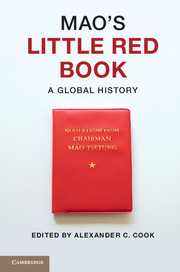Book contents
- Frontmatter
- Contents
- List of illustrations
- List of contributors
- Preface
- 1 Introduction
- 2 A single spark
- 3 Quotation songs
- 4 Mao quotations in factional battles and their afterlives
- 5 Translation and internationalism
- 6 Maoism in Tanzania
- 7 Empty symbol
- 8 The influence of Maoism in Peru
- 9 The book that bombed
- 10 Mao and the Albanians
- 11 Partisan legacies and anti-imperialist ambitions
- 12 Badge books and brand books
- 13 Principally contradiction
- 14 By the book
- 15 Conclusion
- Index
- References
15 - Conclusion
In the beginning is the word: popular democracy and Mao’s Little Red Book
Published online by Cambridge University Press: 05 June 2014
- Frontmatter
- Contents
- List of illustrations
- List of contributors
- Preface
- 1 Introduction
- 2 A single spark
- 3 Quotation songs
- 4 Mao quotations in factional battles and their afterlives
- 5 Translation and internationalism
- 6 Maoism in Tanzania
- 7 Empty symbol
- 8 The influence of Maoism in Peru
- 9 The book that bombed
- 10 Mao and the Albanians
- 11 Partisan legacies and anti-imperialist ambitions
- 12 Badge books and brand books
- 13 Principally contradiction
- 14 By the book
- 15 Conclusion
- Index
- References
Summary
All erroneous ideas, all poisonous weeds, all ghosts and monsters, must be subjected to criticism; in no circumstance should they be allowed to spread unchecked. However, the criticism should be fully reasoned, analytical and convincing, and not rough, bureaucratic, metaphysical or dogmatic.
Classes and Class StruggleReligion as politics
Mao’s Little Red Book represented a scriptural authority and emanated a sacred aura during China’s Cultural Revolution. An intense religious atmosphere surrounded the activities and rituals of Mao’s words. Everyday life was immersed in study sessions, discussions, lectures, public performances of Mao’s poems and quotations, ritualistic confessions of one’s errant thoughts, and nightly diary-writing aimed at self-criticism. The study sessions may be seen as a form of text-based indoctrination that resembles religious hermeneutics and catechism, which were not meant to disseminate knowledge and truths but to foster faith, loyalty, and conviction. And the rituals were widely diffused in popular life: the posting of Mao’s quotations on shop fronts, the singing and performing of quotation songs in the streets, the wearing of Mao badges, group sessions for discussing what lessons or wisdom one could learn from Mao’s texts. These activities can be described as a broad aesthetic experience aimed at converting individuals into true believers.
Mao’s Little Red Book was enveloped in a compelling aura of religiosity, and stood at the center of a massive movement. In her recent study Barbara Mittler draws our attention to a propaganda poster entitled “Let’s Set Off a New Upsurge in the Study of Mao’s Works.” The poster shows a group of people in a sea of pinkish flowers, with three major figures of worker, peasant, and soldier in front. Each member of this study group holds a copy of Mao’s Little Red Book in hand, all looking up with a smile to a bright future. All the books are open, suggesting that faithful readers have been intensely reading and studying. Rather than taking up the center of the poster, Mao’s works are spread out in copy after copy and in one hand after another. What is striking is not the elevated image of Mao’s book but its wide dissemination and populist following among the masses. The religious ambiance created by the repetitive book images and avid reading seemed to inspire confidence and faith in the future of the country.
- Type
- Chapter
- Information
- Mao's Little Red BookA Global History, pp. 266 - 277Publisher: Cambridge University PressPrint publication year: 2014
References
- 1
- Cited by



